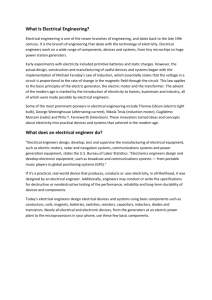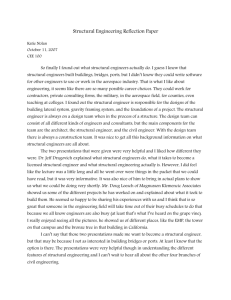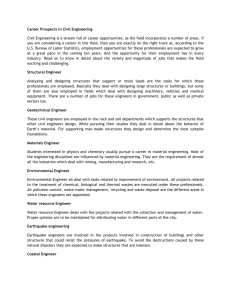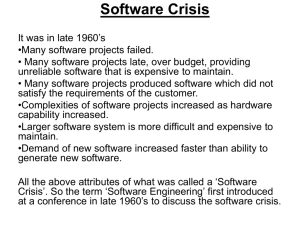Electrical Engineering: Careers & Opportunities
advertisement
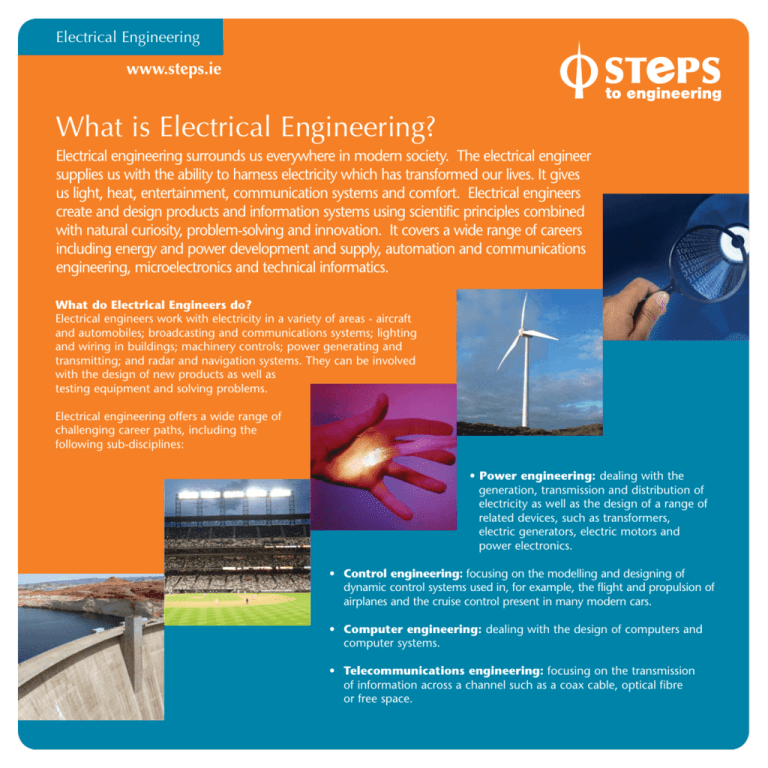
Electrical Engineering What is Electrical Engineering? Electrical engineering surrounds us everywhere in modern society. The electrical engineer supplies us with the ability to harness electricity which has transformed our lives. It gives us light, heat, entertainment, communication systems and comfort. Electrical engineers create and design products and information systems using scientific principles combined with natural curiosity, problem-solving and innovation. It covers a wide range of careers including energy and power development and supply, automation and communications engineering, microelectronics and technical informatics. What do Electrical Engineers do? Electrical engineers work with electricity in a variety of areas - aircraft and automobiles; broadcasting and communications systems; lighting and wiring in buildings; machinery controls; power generating and transmitting; and radar and navigation systems. They can be involved with the design of new products as well as testing equipment and solving problems. Electrical engineering offers a wide range of challenging career paths, including the following sub-disciplines: • Power engineering: dealing with the generation, transmission and distribution of electricity as well as the design of a range of related devices, such as transformers, electric generators, electric motors and power electronics. • Control engineering: focusing on the modelling and designing of dynamic control systems used in, for example, the flight and propulsion of airplanes and the cruise control present in many modern cars. • Computer engineering: dealing with the design of computers and computer systems. • Telecommunications engineering: focusing on the transmission of information across a channel such as a coax cable, optical fibre or free space. Aeronautical Electrical Engineering Biomedical Biosystems, Agriculture & Food Building Services Chemical Engineering Civil Engineering Computer & Software Engineering ELECTRICAL ENGINEERING Career Opportunities Graduates of electrical engineering and information technology work in many fields such as energy engineering, communications engineering, computer engineering, automation engineering, transport engineering, mechanical engineering and also in the media. As part of the electrical engineering team, you can play an important role in the future development of a sustainable environment. There is a wide range of challenging career paths available and as an electrical engineer, technologist or technician, you can work for: • • • • • • Industrial research and development labs Energy supply corporations Software and services companies Civil service Technical monitoring agencies Research institutes and educational institutions. Computer Electronic Engineering Control Industrial & Manufacturing Power Mechanical Engineering Telecommunications Did you know? An Irish engineer, Nicholas Callan of Dundalk, invented the induction coil. This forms the basis for transformers which are used everyday to deliver electricity safely to our homes. As an electrical engineering graduate you can: • Design electrical systems for a wide range of devices including video game consoles and DVD players. • Create the systems that can operate industrial robots or control aviation machines. • Develop the latest in modern applications such as broadband modems or new wireless technology. Employers of electrical engineering graduates include: ABB, ESB, Analog Devices, Eirgid, IBM, Siemens, BT, Eircom, Xilinx and Airtricity to name but a few. Engineering provides a host of exciting opportunities for individual enterprise and job flexibility with rapid progress to creative, responsible and financially rewarding careers. For more information look up www.steps.ie STEPS to engineering is an Engineers Ireland programme supported by Discover Science & Engineering, the Department of Education & Science, FÁS and industry.
